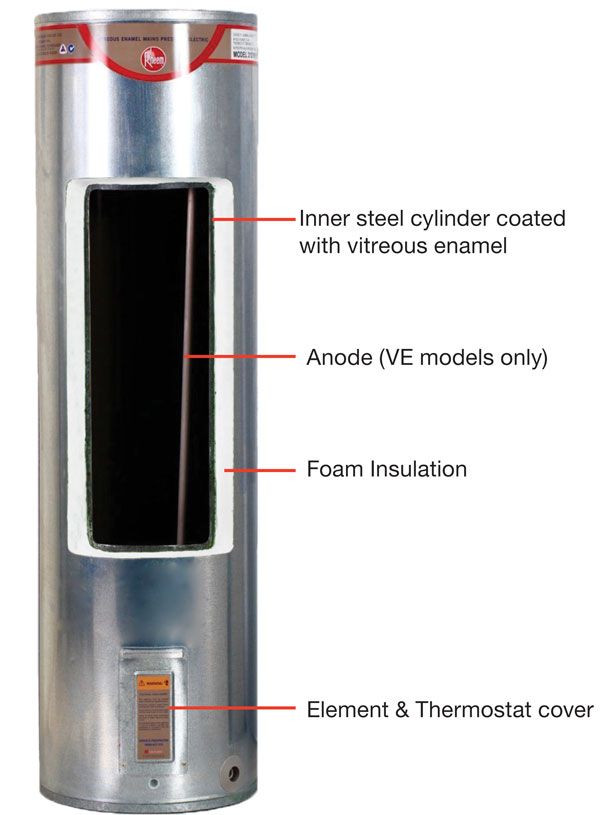Rheem Water Heater Insulation and Energy Efficiency
October 2023
Putting wet rugby boots in the hot water cupboard – the soles stuffed with newspaper, of course – is a profoundly Kiwi pastime. There was certainly no better way to ensure your boots were game-ready again the next morning. Unfortunately for boot-wearing kids (but fortunately for bill-paying adults), those days are all but over. Modern hot water tank insulation is now so effective that not enough heat is leaked into the cupboard to dry anything, let alone drenched, muddy footwear.
For Rheem, insulation has been a massive focus over the last 20 years, and the technology is now saving Kiwis money, as well as reducing their impact on the environment. While insulation has always been an important area for the Rheem R&D team, it was just over twenty years ago that it really became a priority in NZ. In 2002, the first energy efficiency regulations were introduced, and they were some of the most rigorous in the world. In fact, a 2011 Otago University study found that NZ has more stringent energy performance standards for storage heaters than Australia, the European Union, Canada and the United States.[1] The challenge for NZ hot water heater manufacturers became meeting these strict energy performance standards, without creating a product that’s so bulky with insulation that it no longer fits into hot water cupboards.
To meet the MEPS (Minimum Energy Performances Standards) in NZ, water heaters must not exceed the maximum heat loss allowed under test conditions[2], so insulation plays a big role in achieving the required energy performance. At Rheem, we’re constantly testing and refining our products to make sure we meet these standards. We have a dedicated test lab in Auckland that is accredited by IANZ (International Accreditation NZ), as well as a staff member who tests the products full-time to make sure they are compliant. Our R&D team is also constantly developing our technology, so our water heaters don’t just meet the energy standards, but exceed them. We make sure we source world-leading polyurethane foam and work alongside our Aussie and U.S. teams to stay at the forefront of technological improvements.
While meeting the MEPs guidelines is the responsibility of the hot water heater’s manufacturer, there are still a few things plumbers need to be aware of. The first is that not all products available in NZ actually meet NZ energy standards. The TTMRA (Trans-Tasman Mutual Recognition Agreement) allows any water heater that is available for purchase in Australia to be legally imported into NZ. However, not all water heaters available for sale in Australia meet NZ’s stricter energy requirements. So while you would be able to buy these heaters, you cannot legally install them. There are some customers who try to take advantage of this loophole, but they will still lose out in the end. Typically, somewhere between $100 to $200 power is lost a year to heat escaping a heater, but a product with less insulation that doesn’t meet NZ’s strict standards will cost the customer even more. So it may be tempting for a customer to buy a less energy-efficient hot water heater due to the lower upfront cost, but it certainly won’t be cost-efficient in the long run.
If you or your customer is unsure of which water heats meet NZ’s energy efficiency standards, the EECA publishes a list of compliant hot water heaters on their website. You’ll find plenty there to choose from – and don’t forget that choosing the right water heater is a bigger decision than most give credit. An energy-efficient tank with world-leading insulation will reduce energy consumption, saving the customer money and lowering their household’s impact on the environment.
Water Heater Insulation – Article first published in NZ Plumber magazine, issue October-November 2023
References:
- https://www.otago.ac.nz/centre-sustainability/otago055640.pdf
- https://www.eeca.govt.nz/regulations/equipment-energy-efficiency/about-the-e3-programme/products-under-e3/electric-storage-water-heaters/
[1] https://www.otago.ac.nz/centre-sustainability/otago055640.pdf
[2] https://www.eeca.govt.nz/regulations/equipment-energy-efficiency/about-the-e3-programme/products-under-e3/electric-storage-water-heaters/


